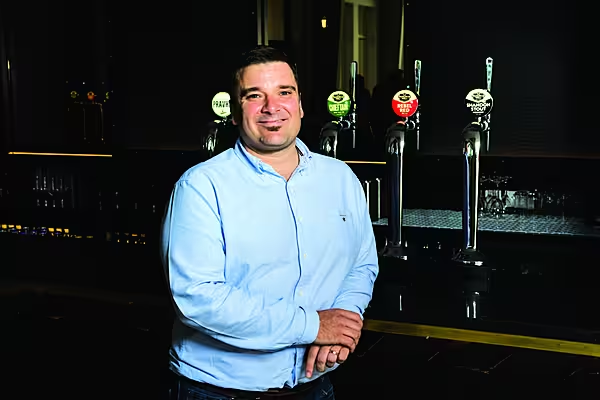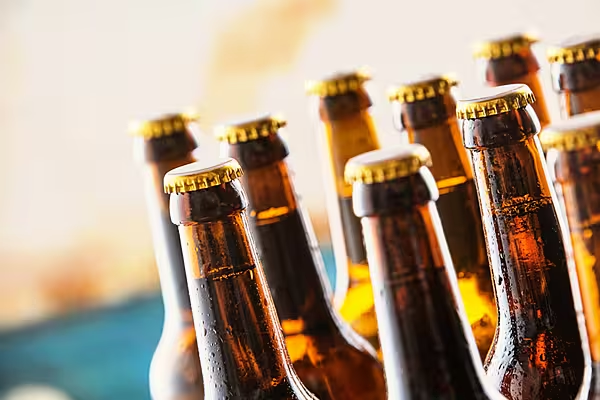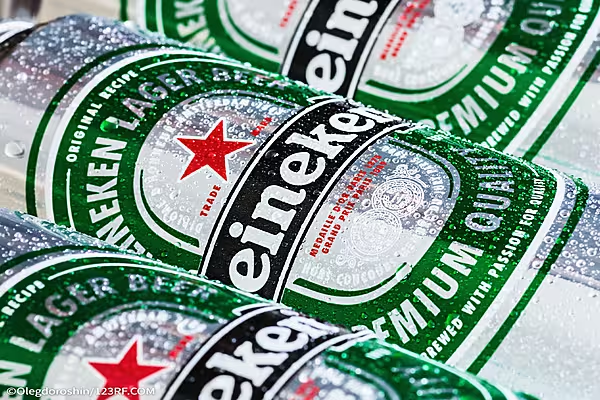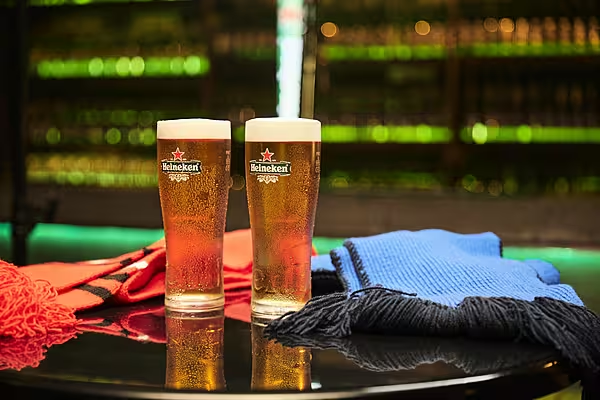Ryan McFarland, general manager for the Republic of Ireland and Northern Ireland with Molson Coors Brewing Company, talks to Maev Martin about building brilliant brands, sustainability targets for 2020, why life leave is so important, and why MUP won’t work
At the end of October, Molson Coors Brewing Company announced a ‘revitalisation plan’ that, among other significant changes, included a name change to underscore its growing interest in competing outside of beer.
The company replaced the word brewing in its name with beverage and then acquired a minority stake in LA Libations, an incubator that specialises in emerging non-alcoholic beverages.
“As we move into 2020, the name change is a strong signal from the top of our organisation that this is the direction that we want the business to go in,” says McFarland.
“We are already in that space in the US, with our hard sodas, so the name change is a signal to the industry that, globally, we will be moving into a space outside beer, including the non-alcoholic space.”
Championing choice
McFarland was appointed as general manager for the Republic of Ireland and Northern Ireland in April this year, when he was also appointed to the board of Drinks | Ireland.
He says that his priorities for the Irish market in 2020 revolve around “building brilliant brands” and “delivering first-class service” for customers and consumers.
“The second priority is around our people in Ireland - having the right people in the right place with the right tools to exceed customers’ expectations,” he says.
“I believe that smiling colleagues leads to smiling customers, so I am passionate about building up engagement levels in our team. My third priority in the Irish business is about championing choice and that is all about making sure that we have a portfolio of international beers and ciders that give people choice as trends change and people decide that they want to explore more.
What choice means to me, is making sure that we have brands that deliver, regardless of the location – whether it is in the local pub, in a city centre bar, or at home with family and friends.” In Ireland, the focus for the country’s third largest brewer of beer is on building Carling and Coors Light, as well as Franciscan Well from their brewery in Cork.
Premium positioning
McFarland spent 10 years with Bacardi Brown Forman, whose brands were held in Ireland through Edward Dillon.
“I started in the Northern Ireland business in brand development and ended up running that business, and then went on to run wholesale channels and on trade across the rest of the UK,” he says.
“I then moved to Remy Cointreau, working in high-end luxury spirits, where I ran their UK and Ireland wholesale operations for two years. Bacardi Brown Forman and Remy Cointreau understood the premium marketplace and how premium brands behave and that is something that I have tried to bring to my role with Molson Coors.
In addition, working for those two companies gave me an understanding of how international brands behave in domestic marketplaces.”
He points out that Molson Coors in Ireland is a local brewer with a global business and that allows them to give consumers a taste change, such as Staropramen, “a Czech Pilsner that combines tradition, modern technologies and innovation and is appreciated in 38 countries”, and Blue Moon, “a medium-bodied, unfiltered Belgian-style wheat ale” spiced with fresh coriander and orange peel.
“We can bring these international brands from our international business, along with Franciscan Well in Ireland, and that helps us move further into the premium space,” he says. “In addition, drinking habits are changing - consumers want to consume less and consume differently.
That includes local craft beers or international world beers, so we want to provide brands that help customers and consumers to experiment in that space.
The premium space is very important to us and we will be actively innovating in this area while investing in our core brands. The low and no-alcohol space is also very important to us. In Ireland, we have Bavaria Zero and Cobra Zero, so we are focusing on the growing that portfolio.”
Their ‘Beer Print’
In 2017, Molson Coors launched a series of CSR goals called ‘Our Beer Print’ to take the company through to 2025.
“Within that, we are aiming for 100% of our packaging to be reusable, recyclable or compostable by 2025, and we are aiming to reduce our carbon emissions across all of our operations by 50% by 2025,” says McFarland.
“We are part of quite an elite group of companies whose ambitions are aligned to the Paris Climate Agreement in terms of carbon emissions.
We will remove single use plastic from both the Carling and Coors Light brands by March 2020 – we will remove the film wrap on the large multi packs and replace it with a 100% recyclable and fully enclosed carton.
By the end of March 2021, we will remove single use plastic rings from all Carling and Coors Light brands and move to 100% recyclable cardboard sleeves. The investment that we have made in these measures is around €1.8 million.”
In addition, the Franciscan Well brewery in Cork has just become a zero waste to landfill site, which means that none of the waste produced there goes to landfill but is used in a waste to energy recovery system.
“We have done the work ourselves and worked with our local waste management partners to ensure that all waste at the site is either recycled or used to produce energy, so it doesn’t go to landfill,” he says.
The team at Franciscan Well, led by Terence Collins, have been really focused on that over the past year, so we are really proud of them.”
Minimum Unit Pricing
McFarland doesn’t believe that Minimum Unit Pricing (MUP), as it is currently being proposed by the government, will achieve its objective of reducing the amount of below cost beer sold on the market and tackling alcohol abuse.
“As MUP is currently being proposed, we wouldn’t be in favour of it, as it will encourage consumers to trade up to higher strength products outside of MUP,” he says.
“A flat MUP across all alcohol categories, regardless of strength, isn’t the right approach to tackling alcohol abuse and it only negatively effects lower income consumers and encourages them to trade up to higher priced products and has the opposite effect of the policy’s intent.
In addition, we don’t believe that selling alcohol at a low price or below cost builds any respect for brands, and it undermines the role that beer plays as a simple pleasure that should be consumed sensibly with family and friends.”
Future investments
Molson Coors bought London brewery Hop Stuff from administration this year and its acquisition of Franciscan Well back in 2013 has proven to be a major success story for the company in Ireland. Does Molson Coors have any plans to acquire any craft brewers in Ireland in 2020?
“Franciscan Well has been a huge success story for us,” says McFarland. “We have taken it from a brand doing less than 1,000 hectolitres in Ireland to one doing 19,000 hectolitres north and south. Our focus at the minute is on growing our core brands to provide our consumers with great quality beers from Franciscan Well in Cork, as well as our international beers and ciders. We are always looking to meet consumer needs so, if we believe there is a need and opportunity for it, we will consider acquisitions, but it is not in my plan for 2020.”
Investment in digital is a major area of focus for Molson Coors over the coming years.
“We are driving that on two platforms – we are aiming to be a really easy to do business with company and on then finding innovative ways for those customers that we do business with to improve their proposition,” he says.
“In the last year we have invested in a central team of 15 people who are responsible for Ireland and the UK, and a further two roles that have responsibility for digital activation in the Irish market. It is a work in progress, but it is an area that we see as important to our customers and consumers and one that we are investing in.”
‘Life Leave’
Molson Coors introduced ‘Life Leave’ for staff last year. “The way people work is changing, and our ambition is to ensure that our people perform to their best,” he says.
“In order to do that we had to provide flexibility as people’s personal priorities are all different. Life Leave is about providing all of our employees with the opportunity for an additional two weeks fully paid leave, on top of annual leave, and that is to ensure that they can be there for the moments that matter in life. It could be an upcoming wedding, a child’s first day back at school, or someone welcoming a new puppy into the family," he adds.
"Life leave also applies to looking after elderly parents or relatives or a sick child. Essentially, it is about protecting the holiday leave that people have so they get the downtime they need to relax. We have guidelines around what is covered but it is between the staff member and their line manager. People apply for it in the same way as they apply for annual leave, so we can track it, but it is also a trust-based system. I believe we are the only drinks company in Ireland that has introduced this, so we are leading the market with this initiative and we are very proud of it.”
Molson Coors introduced another initiative last year that focuses on protecting the wellbeing of its staff. Titled ‘Mental Health Champions’, the programme trains employees to become mental health first aiders in the business to help the organisation to protect employees’ mental health.
“This year we have put in three mental health champions in our three sites across Ireland – in Belfast, Cork and Maynooth – and we support our teams throughout Ireland with these champions who have been trained to encourage an open culture where people realise that it is OK to say that you are not OK,” says McFarland.
“These Mental Health Champions provide guidance if employees need medical or professional support. People apply to take up the Mental Health Champions role to support their colleagues and they are then given training and it is their responsibility to make space to be a Mental Health Champion within their role. I want to create an open culture where people can say how they feel and where we all put an arm around our colleagues and support them if they need it.”
Molson Coors in Ireland
• Molson Coors share of the Irish market has doubled over the last six years (total on and off trade).
• Molson Coors holds a 13% share of Ireland’s off trade lager volume.
• There are two Molson Coors brands in Ireland’s top 10 lager brands (excluding Coors Light).
• Franciscan Well is the most widely distributed craft brand in the Republic of Ireland on trade, with more taps than any other brand.
• Chieftain IPA and Rebel Red are the top two selling craft brands in the Irish on trade.
• Carling is the #1 standard lager in the market in both the on and off trade
All data comes from AC Nielsen on and off trade databases to end November 2019









